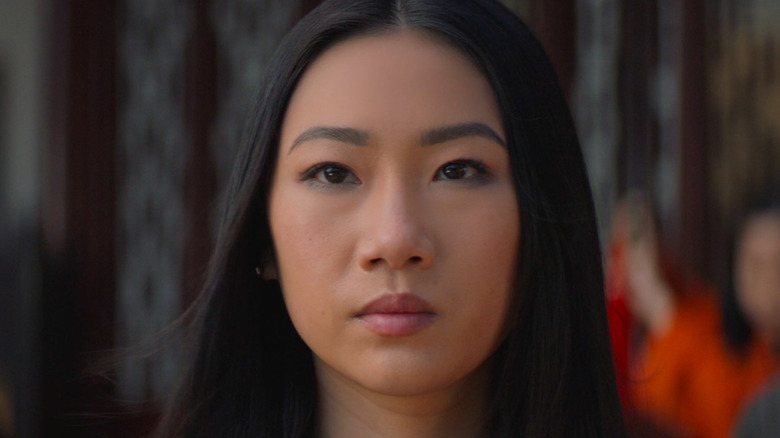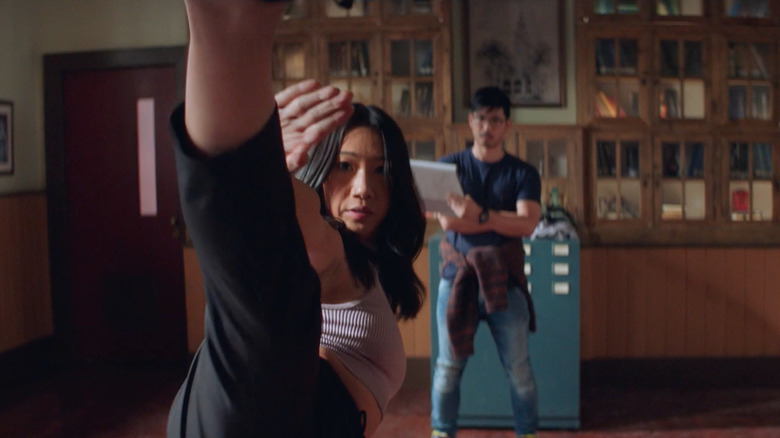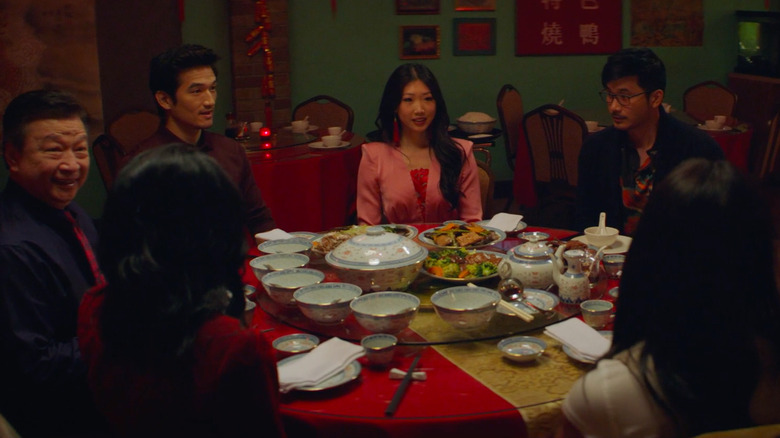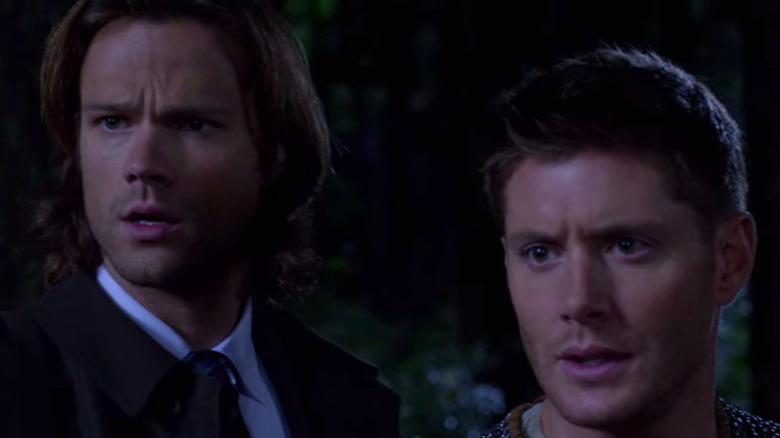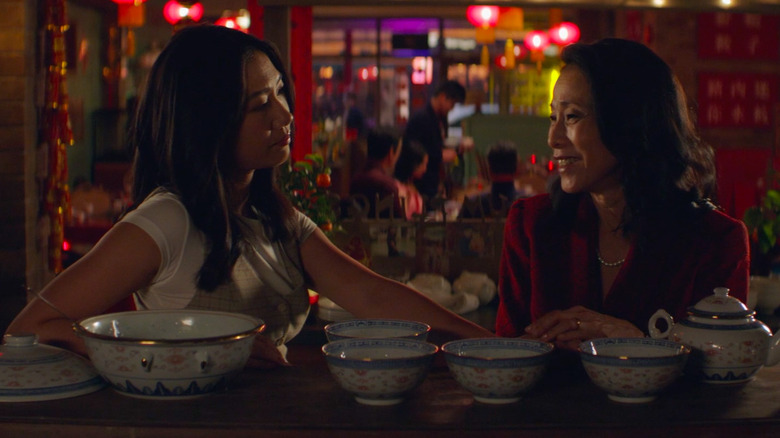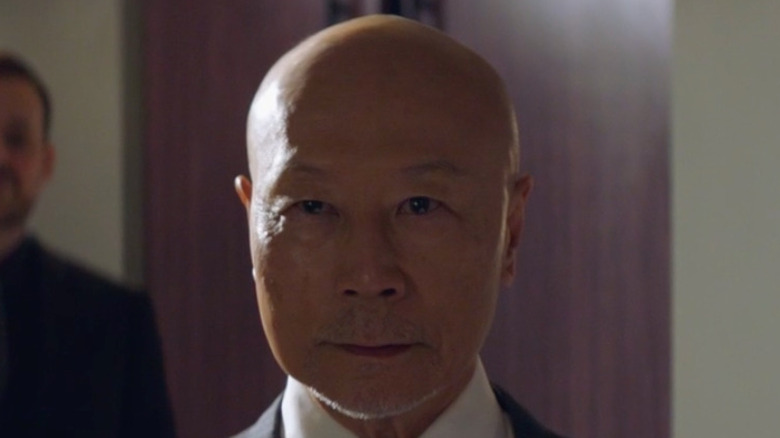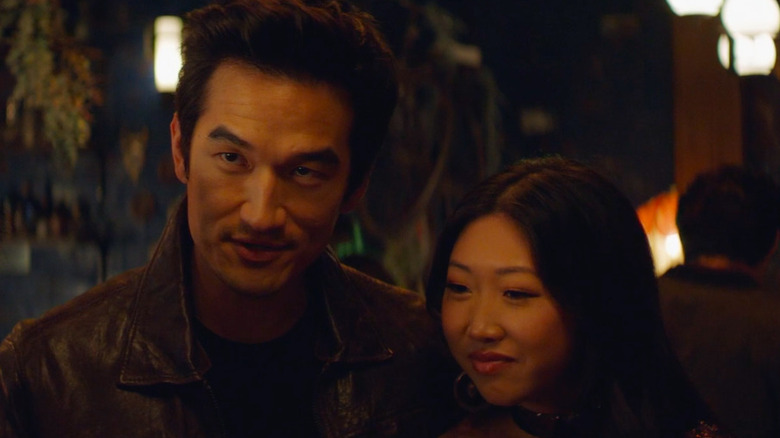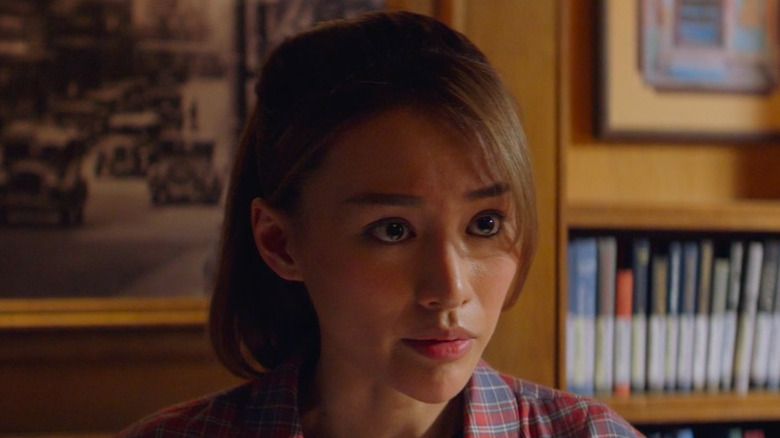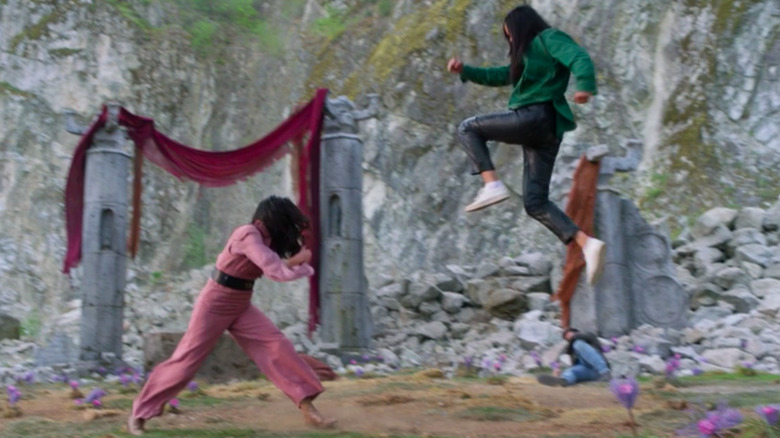Kung Fu Showrunners Christina M. Kim And Robert Berens Detail Season 2 Strategy & Storylines - Exclusive Interview
"Kung Fu" fits perfectly among the superheroes and supernatural beings that populate its network, The CW. The show also stands out for foregrounding a strong Asian-American female lead character and her first-generation Chinese-American family. The story centers on Nicky Shen, a young woman who drops out of college after discovering Kung Fu at a Shaolin monastery during a trip to China. In the first season, Nicky returns to her hometown of San Francisco after three years and the death of her mentor. There, she reconnects with her family, including her mother Mei-Li (Kheng Hua Tan), her father Jin (Tzi Ma), her sister Althea (Shannon Dang), and her brother Ryan (Jon Prasida), and finds herself in the middle of a race against time to stop her mentor's killer's dangerous plans.
Season 1 tells an engaging story that portrays Nicky rebuilding her endearing relationship with her family while it also spins a complex mythology of mystical proportions. The second season of the show is continuing that tradition, even as it brings in even bigger villains, like the elusive Russell Tan (Kee Chan), and new characters, like Nicky's mysterious cousin Mia (Vanessa Yao). In an exclusive interview, Looper spoke with "Kung Fu" showrunners Christina M. Kim and Robert Berens about the creation of the series, how they balance the show's family story with its increasingly complex mythology, and what fans can expect in Season 2.
Creating a Reboot with a Strong Asian lead... and her family
Christina, as the creator of the reboot, what made you feel this story could be updated for today?
Christina M. Kim: Well, I really selfishly wanted a really strong female Asian lead — a hero, really — and this was my opportunity to do it. "Kung Fu," obviously, has a huge name, it's a big title, and it felt perfect that I could update it. I was given the creative freedom to update it pretty much in any way that I thought would be right. I took it and ran with it and I put a lot of my own family and my friends into the Shen family and into Nicky, a lot of myself into Nicky, and it was really fun to develop.
The show is not only built around a Chinese-American woman, but it incorporates her whole family. What made you decide to include that in the show?
Kim: Honestly, for me, Asian families, my family included, we're all so close and it felt like writing Nicky, at least the way that I envisioned Nicky, in a bubble wasn't going to work. When I was thinking about her backstory, I was thinking about what would make her story resonate with my own family, with my friends, if they were to be watching it. I was thinking about a character who basically had a nervous breakdown and ran away and dropped out of Harvard; obviously, there are people in her life [whom she thinks she] was letting down. That would be mom and dad, number one, and then friends and boyfriends and siblings. It felt like this rich world. It also gave me the freedom to not have one Asian character on a show and that be it.
I've got an entire cast of ten series regulars that all have their own stories, have their own romances, their own troubles and complexities that I can write to. As we develop this season, I think that's been the most fun for Bob and for our writers and for me is that you don't feel this pressure to make the Asian character be perfect and to represent everyone. We have all kinds of Asian characters and that's okay. That was part of it, and it was really creating this rich world, something that we haven't seen on network TV before.
What have you hoped to convey about Asian culture and the Asian American experience through the show?
Kim: It's about relatability. Because we have so many different characters on the show, there's someone on the show for everybody. If you want a little bit of humor, Althea's got a story for you, and then we find out that Althea actually has had more serious things going on in her life. She had a workplace trauma that she's working through. There's so many layers to all these characters that it's about having someone that you can relate to that you see on the screen, and having different characters, allowing many people, hopefully, to watch the show and feel that they can relate.
Making a heartfelt story while building a complex mythology
"Kung Fu" has a deep mythology, but it's also a very heartfelt story about a family and a community. How do you go about maintaining both threads and making sure that they're both equally represented for the audience?
Kim: Bob, you want to jump in with that one? Because Bob is so good at that. That's one of the toughest things about the show is the balance, and I feel like that is one of Bob's many strengths is keeping that balance.
Robert Berens: In the first season, we had so much character drama to work through because Nicky was coming back after three years and she had so much history with her family, but she also had so much history to catch up with on her family and what they'd been through in her absence at the beginning of the first season. She's realizing that her family has changed in her absence and she has to catch up with them. It was more of a slow burn with the mythology where you had Zhilan kind of bobbing halfway across the world while Nicky was dealing with stuff on the streets of San Francisco.
It was always our intention that the second season would be very different in that, A, Nicky has gotten to a much better place with her family. They're operating as a unit both emotionally and normally as a family and also in that they're all on the same page. Everyone knows what Nicky's up to and everyone, to varying degrees, [is] actually helping Nicky protecting the community and saving the world.
It was always our intention that Season 2 would be a much more integrated season where the villain and the threat is occurring in San Francisco, right in Nicky's backyard, and also, through the Mia character, that there's this connection between the larger myth plot and the danger of Russell Tan and Nicky's family. Mia straddled the two worlds of our show, and [it] allowed us to tell a story that's much more integrated than last season, and also faster moving.
Drawing on their previous experiences in TV
You both have some pretty amazing previous experience in TV — Bob with "Supernatural" and "Doom Patrol," and Christina with "Lost" and "Blindspot" and "Hawaii Five-0" and "NCIS: Los Angeles." What did you learn from working on those previous shows that you've now brought to "Kung Fu?"
Kim: Ooh, that's a good question. I've never been asked that.
Berens: I'll jump in with one thing, which is that on "Supernatural," I came in what I thought was late in the show's run — we ended up going for quite a while after — and fundamentally, the viewers are so invested emotionally in Sam and Dean and it's really the brotherhood, the bond of those brothers, and also [Castiel], but what happens to those two and those three is so important to the audience. It's really the heart of the show.
It became clear to both of us, very early on, and even in Christina's original design for the show, that the family is the heart of our show. We have a lot of plates in there. We've got myth and really delicious villains and complex villains and romance and action, but the heart of the show is the family. We keep learning more and more, "How do we bring the emotion of the family, the comradery, and love and support of the family, center stage even while all this crazy stuff is going on?" That's really the core thing I brought from "Supernatural," for sure.
Kim: Writing rich characters, that's where we really wanted to spend a lot of time in developing the show. I've been on shows where you couldn't delve into the character's backstory and shows where I was told by the show runner, "Oh no ... we won't go into their personal lives."
I love that on our show, we really get to know our characters. For me, figuring out the mythology beforehand was the biggest thing that I wanted to nail down. Having worked on "Lost," where the mythology was not nailed down, and it was a very scary place to be – I was junior enough that it wasn't scary personally for me – but I would imagine it was very scary to write into a vacuum and not know where you were going.
I never wanted that for "Kung Fu." We spent a significant amount of time in the beginning of Season 1 and Season 2 figuring out the mythology, where we were going, and where we were ending up. Once we had that roadmap, it felt like we were able to break stories much easier because we knew where we were going. That was my biggest key, learning from previous job experiences, is to really hammer down and figure out what the mythology is.
Being "mindful" of the difficulty of this time in America
"Kung Fu" premiered at a time when anti-Asian hate crimes were on the rise. Was there any extra pressure in writing the show because of that?
Kim: When we premiered, we had really written a good chunk of the season already. It was either the day that we were premiering or the day that we were doing press for the premiere, [when] the attacks in Atlanta [happened], and everybody was talking about it. It felt like the show, in a strange way, was timely because it was a show about an Asian family with an Asian woman as the lead.
I don't know if we consciously felt the pressure in the early days of breaking the season, but certainly we're mindful of it. We were hopeful that people would have this show as a positive thing that's out in the world, that having a cast of Asian faces on TV every week would help in some small way. We certainly thought that it felt like a privilege that we were able to do it at this really difficult time.
Teasing what to expect from Mia and Russell Tan in Season 2
Getting into Season 2, in the very first episode, we meet Mia, as you mentioned, and she had an incredibly different upbringing from Nicky and the Shens. How will that manifest itself in Mia's relationship with Nicky and the rest of her family?
Berens: Mia is an amazing character in her own right, but a really amazing foil for Nicky, because Nicky had so much drama with her family in the first season she had to work through. The bottom line is she always had a big loving, supportive family and a relatively normal upbringing. Mia comes along and, like Nicky, she's also connected to this legacy, but unlike Nicky, she's had a completely different experience.
She was very, very sheltered, very isolated from the world. Unlike Nicky, [she] was trained in physical combat from a young age by her mother. She's a really interesting foil, and the Shens care about her and they want to help her, but she is, on a certain level, unlike all of them. There's a lot of interesting tensions and differences that we get to explore through that character, and it really shines a light on the magic of the Shen family and brings into a focus how lucky Nicky, for all her troubles and travails, has actually been in her life.
Russell Tan was lurking in the shadows for a lot of Season 1, but he's making some big moves at the beginning of Season 2. Can you tease what we'll learn about his motivations as the season goes on and the way Nicky and Mia seem to be a big part of that?
Berens: What drives [Russell Tan] and what his ultimate plan is [are] the big [mysteries] of the season. We're a lot more open with our demi-bads, Zhilan and Kerwin and certainly Juliet this season, where we understand what's driving them. Russell is a little more sinister and mysterious, but let's just say that question will be answered, and it's going to surprise and excite a lot of people when the answer finally comes.
A 'more serialized' season
Nicky has become a defender of her neighborhood in San Francisco since she returned last season. Will she continue to have time to get involved with the people of Chinatown and tackle social issues this season the way she did in Season 1?
Berens: What you'll find this season — because, as Christina was talking about, planning seasons in advance, even more so in the second season, we had the freedom to really figure out our endpoint and start building backwards from there.
The truth is we have so many characters and they're also integrated in this larger plot that you're going to see that the season is much more serialized and that the overarching plot, as well as the individual character journeys move a lot faster this season. This season only really has one clear standalone episode, and that one is a delightful Althea and Dennis-centric one, Episode 4, coming up soon.
Issues of the community are still very much part of the show, but this time around, they're a little more threaded into the larger story and the individual arcs of our characters, so they will pop up. It'll be more of a tapestry. The first season had a lot more standalones that were more focused on individual stories.
As for Nicky, we're playing that [it] was her summer vacation, taking care of her community, and that she's still very much engaged in it and does get chances to help them out. Her way of protecting her community this season really is connected to, A, protecting Mia and her family and, B, thwarting Russell with his larger plot. Once she comes to learn the danger it poses to San Francisco, it really will be the thing that drives her every single episode.
Better stunts, awesome performances, and story curveballs
Is there anything you're especially excited for fans to see in Season 2?
Kim: Yes. There's a couple things. The action in Season 2 is out of this world. I think Season 1 was amazing. Season 2 is outstanding. We've upped it in every way. All of our actors are working so hard. [Series star] Olivia [Liang] works her tushy off doing awesome stunts, and it really comes together in exciting ways and [it's] beautifully shot as well. I'm excited about that.
Bob mentioned Episode 4, which is a little bit of a different kind of episode. It's very comedic, and I'm excited for the fans to see a different shade of "Kung Fu" and I'm excited about how talented our cast is because, yes, they can play drama, but they're also all really funny.
What about you, Bob?
Berens: I'm excited for everyone to meet our new characters and to see all the new shades that the cast brought out in our established characters. We have a really large cast and there's not a weak link in the bunch. Everyone delivers really fantastic performances throughout the season, and surprising performances. I can't wait for people to take that ride.
I'm really proud of what me and Christina and our writer's room, how we've broken the season, because it's a very myth-forward season. The overarching plot is really humming on all cylinders throughout, but at the same time, I think each episode has a really strong core identity. I'm really excited because there's some curve balls in there, but the puzzle pieces all really come together to tell a really fantastic and surprising story. I'm excited for audiences to take that ride.
Stunts that aren't 'just fights for fighting's sake'
As you mentioned, Christina, there are some unbelievable stunts and fight sequences in the show. How do you come up with them and how are they woven into the story?
Kim: We approach fights a little bit differently than most other shows or procedural shows. Credit has to go to Andrew Chin, who is our incredible stunt coordinator who comes up with the fights, but we want to make sure that these fights are not just fights for fighting's sake. They're fights that are emotional. We want to make sure that the audience is understanding Nicky's head space in these fights as well. It's not just punching and kicking. We have a lot of conversations with our stunt coordinator about the intention of the fight. What's Nicky's motivation? What does she want to get out of the fight? Also, her opponent, where are they coming from? What do they want, who is their character? That informs the types of fight moves and the overall choreography.
For us, that's the most exciting part, is to be able to translate our words into a fight, like watching a dance of your work. That's why the fights on our show stand out even more in Season 2, is that we've really figured out the way to do that. Again, it's all the hard work of our stunt team, Andrew Chin, and Olivia, and all of our actors. They're incredible.
Berens: I'll add one thing — the first season was shot during the first wave of production after COVID, and we didn't really have the resources to do more than one fight per episode, in most cases, outside of a few exceptions. Andrew Chin and everyone involved in the cast and crew and production, we really pushed ourselves. There's more. Episodes will have more. Also, we have a bigger cast that are all involved in this larger plot, so you'll see episodes where Nicky gets a fight and Henry gets his own fight in a B story.
Episode by episode, the tonnage of action is up and that was really exciting and really with no sacrifice in quality. Andrew and his team, they kept delivering. I think we're raising the bar all around this year.
The second season of "Kung Fu" airs on The CW at 9:00 p.m. ET. New episodes are available on the CW website and app the following day.
This interview has been edited for length and clarity.
